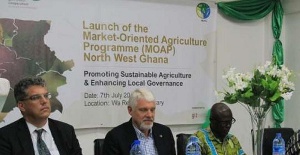The Market-Oriented Agriculture Programme (MOAP), will focus on building strong ties between local farmers in North West Ghana and processors of agricultural produce around the globe.
These processors will add value to the produce, generate employment and create wealth for smallholder farmers supplying them with the necessary agriculture produce.
Mr Bernhard Abels, Deputy Head of Mission at the German Embassy who made this known during the launch of the programme in Wa said the project would equally help smallholder farmers to produce the type of crops and the required quality that was demanded by strong private sector off-takers.
He added that the programme would create win-win conditions for both processors and smallholder farmers.
He gave the assurance that processors would be able to secure raw materials while smallholder farmers would enter into long term agreements with off-takers who would receive extension services as well as finance and be able to fetch good price for good quality.
'This will give them long term planning security and how to earn steady income', he said.
Mr Abels pointed out that with more irrigation and the support of tree crops such as mangoes and cashew, smallholder farmers would be provided with the opportunities to crop also outside the traditional cropping season.
He said this presented people with a real alternative to migration, as it was time to transform the African economies that were built on the export of unrefined raw materials to value added economy that provided jobs to the strong middle class societies that lifted the mass of the people out of poverty.
Mr Abels said the project launch provided an important mile stone towards value addition for agriculture raw materials.
He said he agreed with President Nana Addo Dankwa Akufo- Addo when he said Ghana had the human resources with women and the youth at the forefront to transform the structures of the economy and to be part of the international division of labour at the high end of the value.
Mr William Hanna, Ambassador of the European Union (EU) Delegation in Ghana said the Union made up of 28 different countries after a number of years of war against each noticed that they could only solve their problems if they worked together.
He said after agreeing to work together for their common goal, it was then decided that they start from agriculture since it was a critical component of many economies around the world.
Mr Hanna said Ghana was so much connected to what was happening in the international gallery with respect to agriculture, which was good for the country in terms of getting support to develop its agriculture sector.
He said the EU believed strongly in the Paris Agreement on climate change, hence its preparedness to support Ghana to build the needed resilience in the agriculture sector.
Mr Amidu Chinnia Issahaku, Deputy Upper West Regional Minister expressed appreciation to the EU for the investment being made to improve lives of the vulnerable and reducing poverty in the area.
He observed that by strengthening the resilience of smallholder farmers could guarantee food security and improve livelihoods for the people of the Region and the three other beneficiary districts in the Northern Region.
Business News of Monday, 10 July 2017
Source: GNA

















